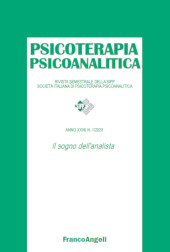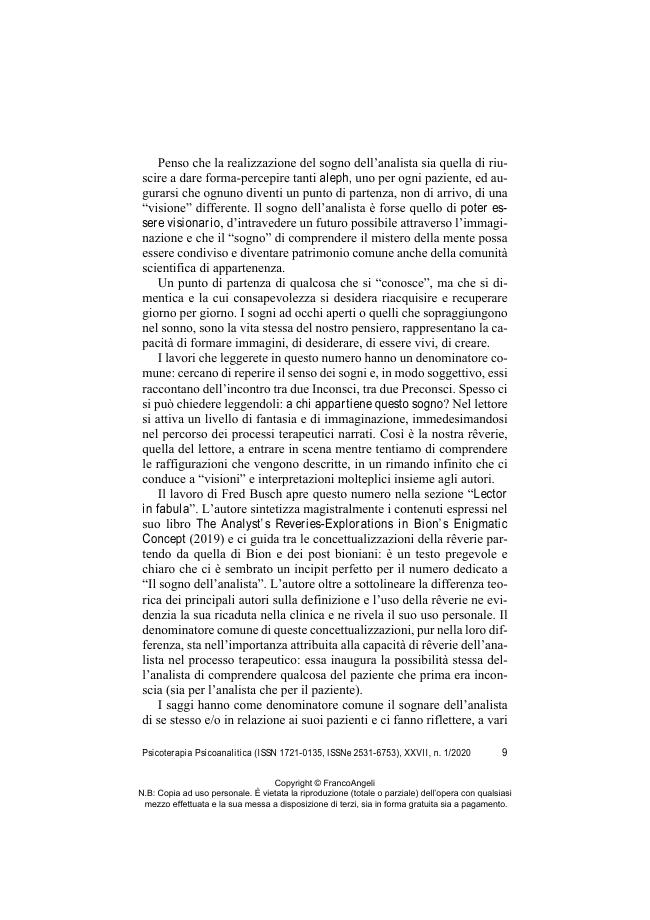Editoriale
5-13 p.
In questo editoriale il Direttore annuncia il progetto di dedicare il prossimo numero, in uscita in dicembre, all'emergenza del contagio che stiamo vivendo. Questo progetto, che prima si era pensato di anticipare in un forum in questo numero, è stato poi rinviato: in questo modo, prima di formulare una riflessione teorico-tecnico-clinica sulla psicoterapia dell'emergenza, si vuole sostare nella "capacità negativa", mentre si sta vivendo una situazione traumatica insieme ai pazienti e alla comunità. Il tema di questo numero "Il sogno dell'analista", d'altra parte, appare, in questo momento, portatore di "un principio di speranza": quello di riuscire a continuare ad essere "visionari". Questo accade nel processo terapeutico, se la mente psicoanalitica funziona, quando s'intravede l'Inconscio attraverso la rêverie, il sogno della veglia e i sogni del sonno, quando si riesce a dare un possibile senso che viene dall'Inconscio del terapeuta e del paziente.
La domanda che viene spontanea è dunque: a chi appartiene il sogno? La libera associazione dell'autrice riporta a L'Aleph di Borges; l'aleph è una sfera roteante che compare all'improvviso all'autore, all'interno della quale prendono forma volti, memorie, immagini potenti raffiguranti il destino e la sua storia soggettiva, ma anche quella dell'umanità. Le sensazioni-percezioni e i pensieri sono così vividi che egli deve rimuovere questa "visione", pur sapendo di averla in mente da qualche parte. Così l'intuizione, la visione, la verità ultima possono "apparire" nella nostra mente, ma poi devono sostare sullo sfondo e costituire il punto di partenza e non di arrivo: bisogna riscoprire la verità soggettiva giorno per giorno. Tutti i lavori di questo fascicolo sono presentati brevemente: essi parlano del sognare con il paziente, sul paziente o su se stessi, attingendo alla propria mente, alle proprie passioni, alle libere associazioni con l'arte, la letteratura, la musica.
Questo il denominatore comune che testimonia che il lavoro del sogno è un atto creativo che tocca le passioni e i desideri di ogni analista e che ha le sue radici in quello che la sua mente elabora in relazione ai suoi interessi soggettivi e al mistero dell'incontro con l'altro. [Testo dell'editore].
In this editorial, the Director announces the plan to devote the next issue of the Journal - to be published in December 2020 - to the emergency we are living right now. Originally, the editorial board had considered devoting a forum to this subject in this very issue, but then the project was postponed. Before producing a theoretical, technical and clinical reflection on emergency psychotherapy, we want to dwell on the "negative capacity" while experiencing a traumatic situation with our patients and the community as a whole. However, the theme of this issue: "The analyst's dream", currently appears to be offering a "principle of hope", that is, the possibility to safeguard the ability to be visionary. In the therapeutic process, this is possible when a psychoan-alytic mind is at work, when the unconscious can be gleaned through reveries, daydreaming and night dreaming, when meaning can be found through the therapist's and the patient's unconscious.
One ques-tion arises naturally: whom does a dream belong to? The Author's free association leads to Jorge Luis Borges' The Aleph, a revolving sphere that suddenly appears to the narrator. Faces, memories, powerful imag-es depicting destiny and his personal history, but also the history of humankind, take shape in it. His perceptions, feelings and thoughts are so vivid that he has to set this "vision" aside, even though he knows that it will keep on lingering somewhere in his mind. Intuition, vision and the ultimate truth can "appear" in our mind but then, they have to linger in the background as a starting point, not as a point of arrival. Subjective truth needs to be rediscovered day by day. A short presentation is offered for each paper in this issue: topics include dreaming with a patient, on a patient, on oneself, while drawing upon one's own mind, one's passions or one's personal, free associations with art, literature and music.
All these papers prove that dream work is a creative act touching upon every analyst's passions and desires: an act that is rooted in the analyst's working and processing mind set in relation with one's subjective interests and the mystery of encountering the Other. [Publisher's text].
Ist Teil von
Psicoterapia psicoanalitica : 1, 2020-
Artikel aus derselben Ausgabe (einzeln erhältlich)
-
-
Informationen
ISSN: 2531-6753
KEYWORDS
- Sogno, reverie, capacità di essere visionari, principio di speranza
- Dream, reverie, ability to be visionary, principle of hope



